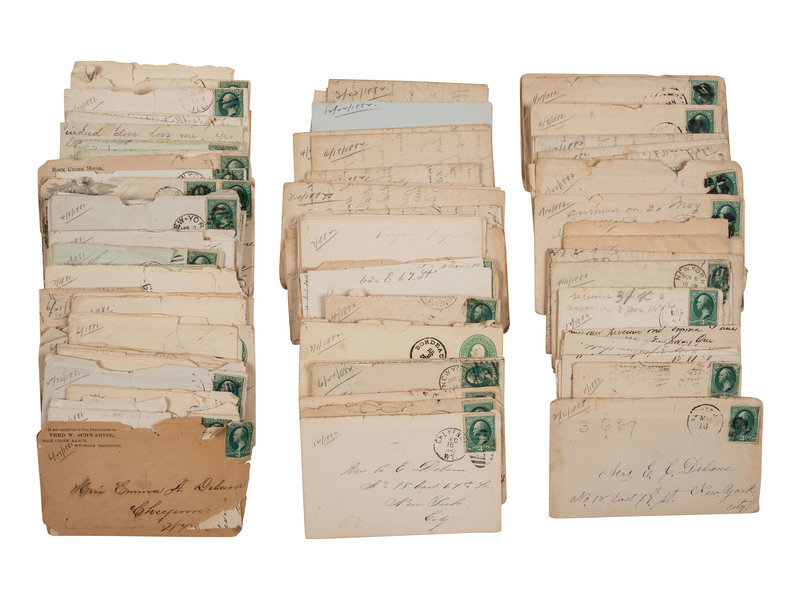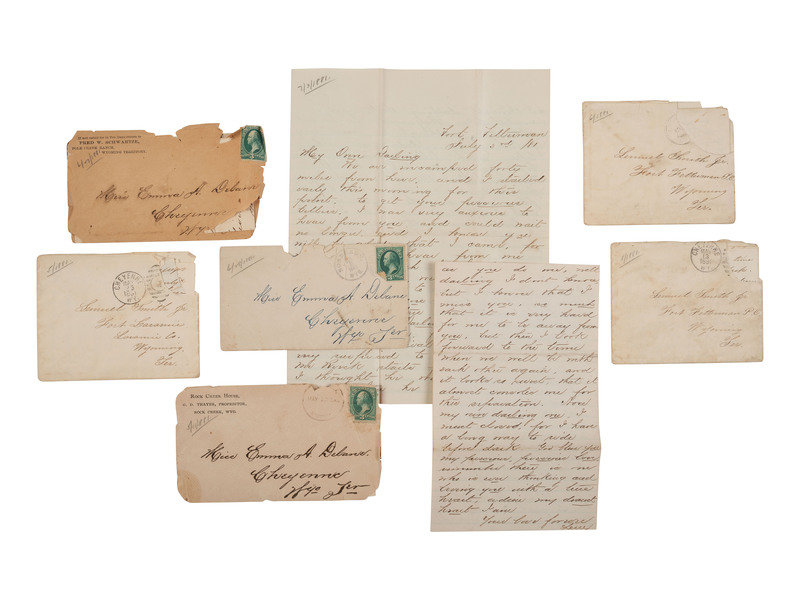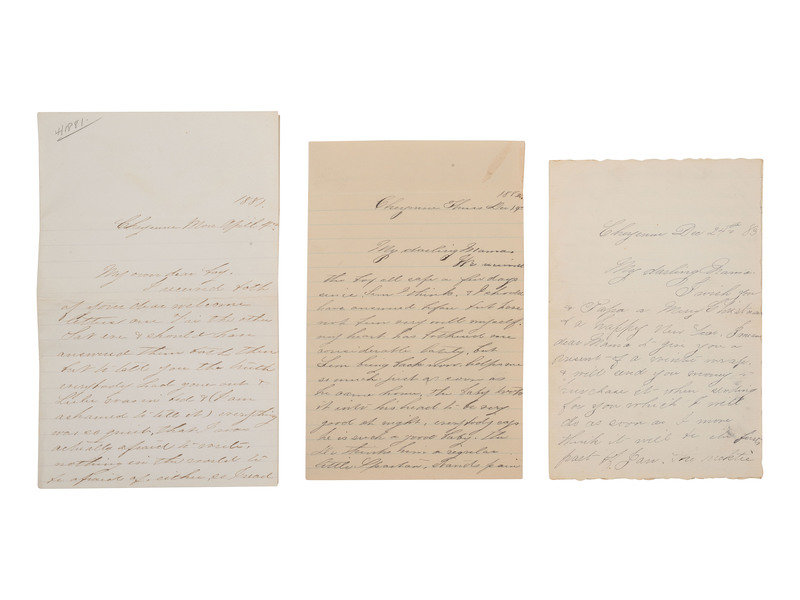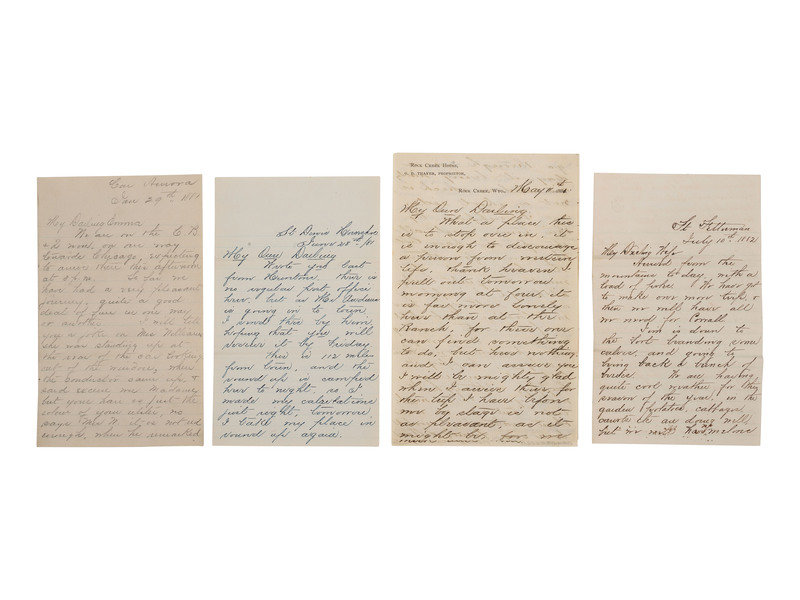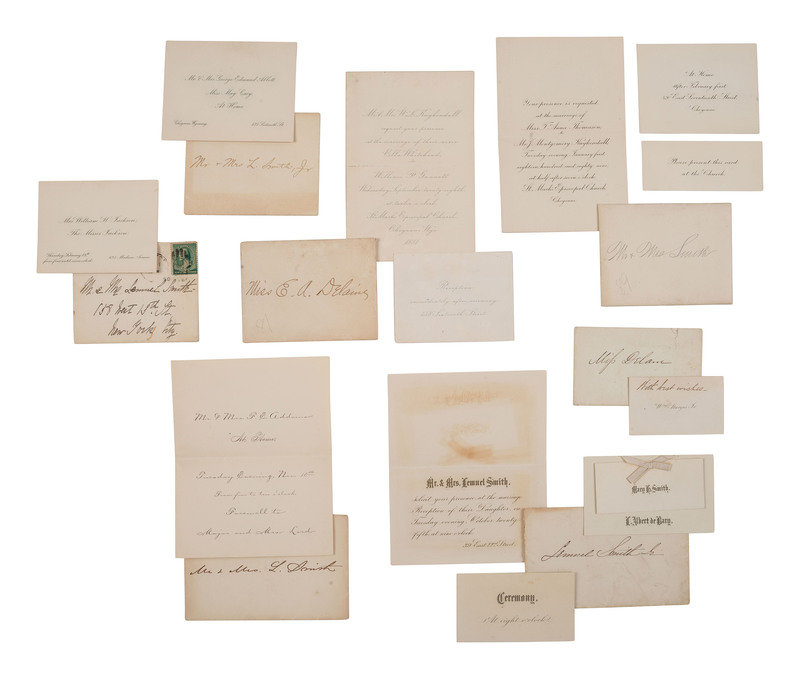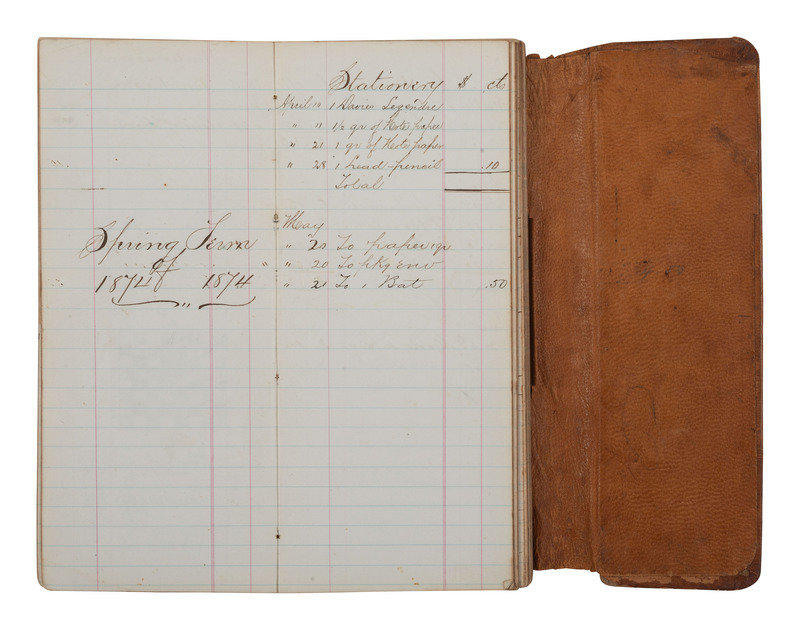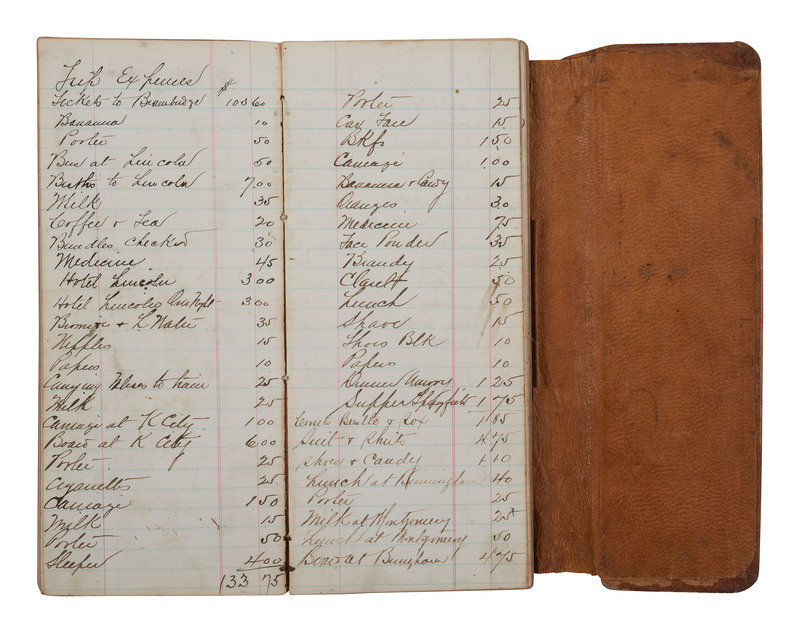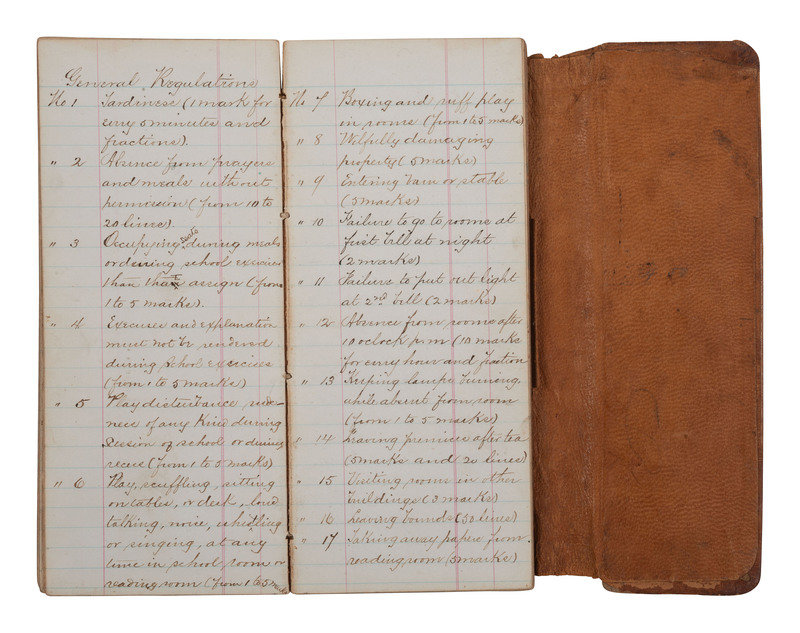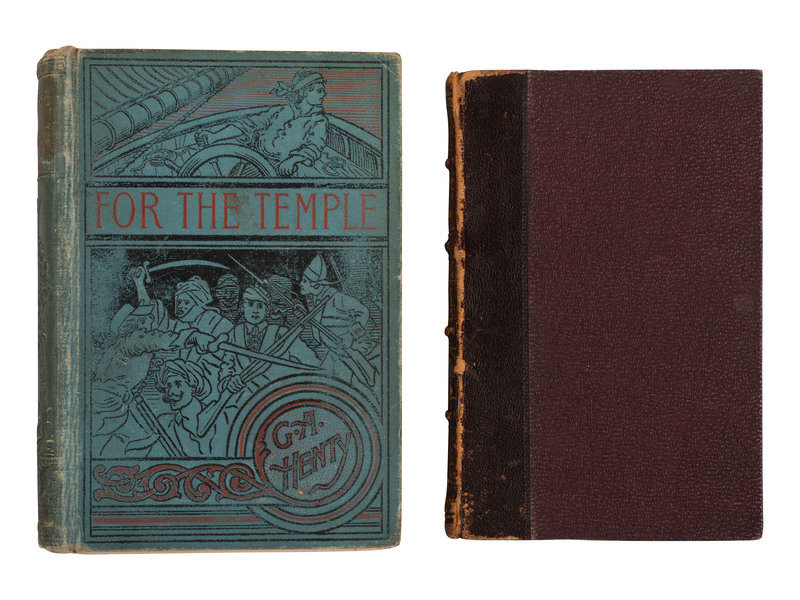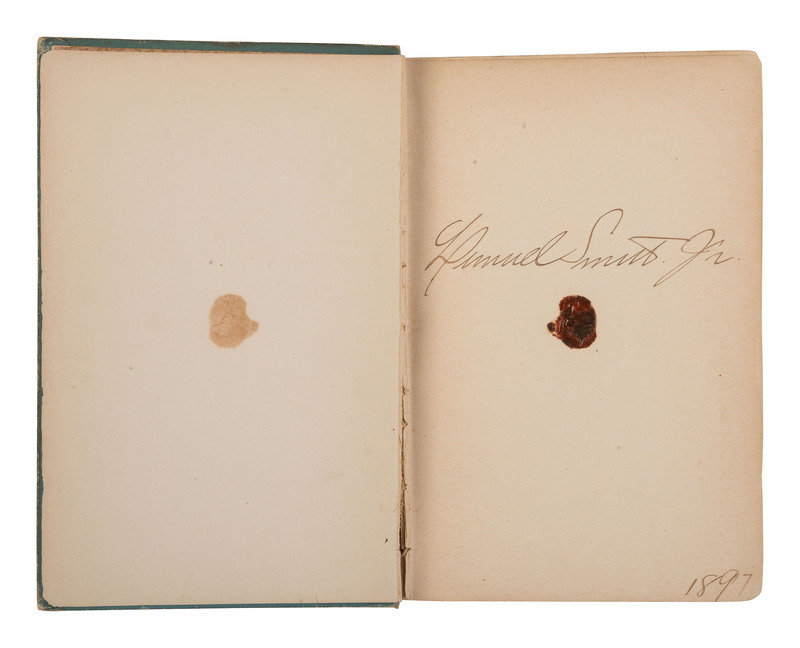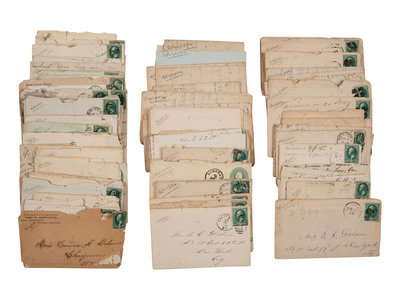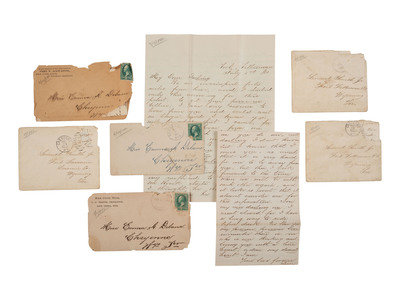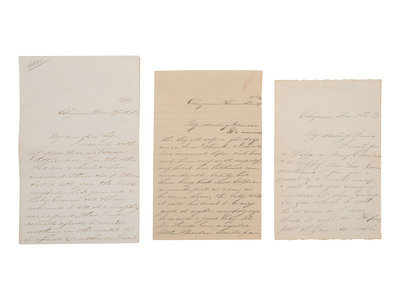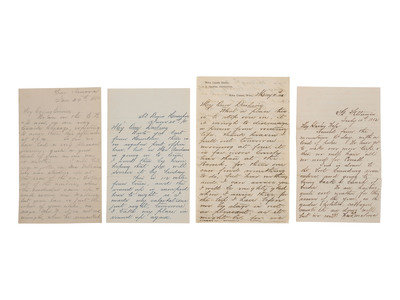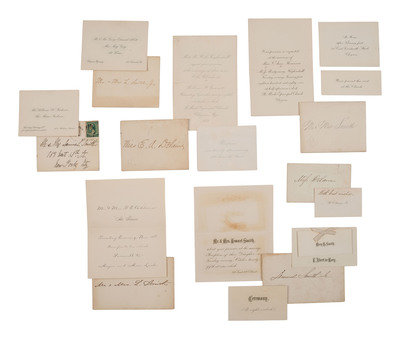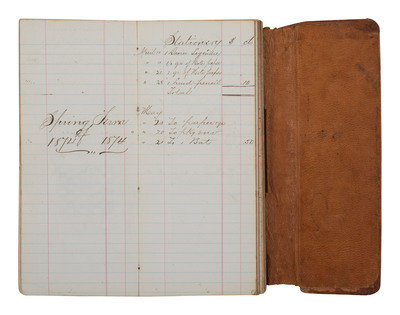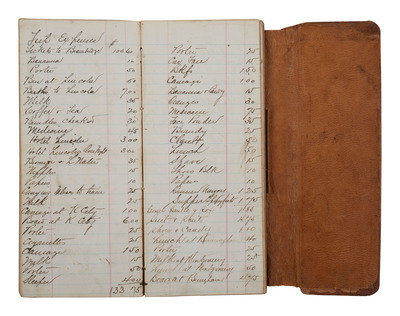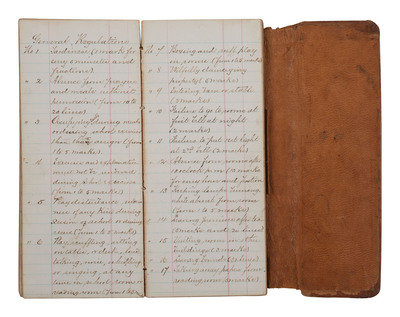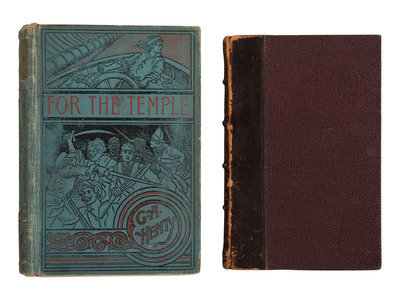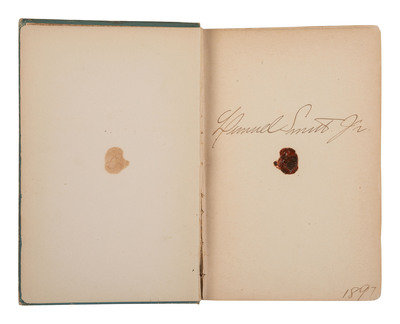[WYOMING TERRITORY]. Letter archive of Wyoming Stock Growers Association member Lemuel C. Smith, Jr. (1857-1930) including descriptions of Cheyenne and the Wyoming cattle industry, ca 1866-1928.
Sale 1250 - American Historical Ephemera & Photography
Nov 30, 2023
10:00AM ET
Live / Cincinnati
Own a similar item?
Estimate
$7,000 -
10,000
Price Realized
$11,340
Sold prices are inclusive of Buyer’s Premium
Lot Description
[WYOMING TERRITORY]. Letter archive of Wyoming Stock Growers Association member Lemuel C. Smith, Jr. (1857-1930) including descriptions of Cheyenne and the Wyoming cattle industry, ca 1866-1928.
Large archive of personal correspondence associated with East coast native turned Wyoming cattle rancher Lemuel Smith, Jr. and his wife Emma Amelia Shafer Delane Smith (1861-1934). More than 200 letters spanning 1866-1928 (bulk 1881-1889), most with original covers. Additional correspondents include extended family members Lemuel Smith, Sr. (ca 1803-1889) of New York, Mrs. Emmeline Arledge Shafer Delane (1834-1912) of New York, and Mrs. Mary Breaker Arledge (1811-1893) of Georgia. Lemuel Smith, Jr., a contemporary of pioneer Wyoming cattleman John C. Hunton, writes from historic Wyoming locations such as Fort Fetterman, Fort Laramie, Hunton's Chugwater, Rock Creek, Schwartze's Ranch at Pole Creek, and the OW Ranch. Provenance: Consignor relates that letters were found in a trunk purchased at an estate sale in Metuchen, New Jersey, sometime ca mid-1980s, and were purchased by consignor at South Jersey Wholesale Antiques Auction ca late 1980s or early 1990s. Emma and Lemuel Smith's son, Lemuel Coles Smith (1882-1968), and grandson Lemuel Arledge Smith (1912-1985), were New Jersey residents.
SCARCE WYOMING TERRITORY LETTERS WITH DESCRIPTIONS OF CATTLE RANCHING AND CHEYENNE SOCIETY AND CULTURE
Born in New York and educated at an East coast boarding school, Lemuel Smith, Jr. ventured to Wyoming in the spring of 1880. There he joined a wave of wealthy Europeans and Easterners who, lured by the promise of astounding profits, invested capital in land and cattle during the Wyoming cattle boom of the 1870s and early 1880s. In 1881 Smith married Miss Emma Shafer Delane, a young woman living in Cheyenne who had her own set of moneyed East coast connections. Lemuel Smith, Jr. established himself within the Cheyenne community, securing membership in the powerful Wyoming Stock Growers Association and in the gentleman's club known as The Cheyenne Club. By 1882 Cheyenne was a prosperous ranching hub and according to some sources was the wealthiest city per capita in the United States. Just five years later, drought, an overabundance of cattle, and the devastating winter of 1886-1887 drove many large cattle operations into bankruptcy. With the bulk of the letters in the archive spanning 1881-1889, Lemuel and Emma Smith's letters encapsulate the burgeoning Wyoming Territory cattle industry, the flourishing city of Cheyenne, and the eventual collapse of the cattle business.
The first Wyoming Territory correspondence is written from May to November 1880 and constitutes letters between Emma Shafer Delane residing in Cheyenne and her mother Emmeline Delane in New York City. Miss Delane's first letter of 15 May 1880 indicates that she has just arrived in Cheyenne after a four day journey from New York City: "we got to Council Bluffs & changed cars for Cheyenne we saw the prairie both flat & rolling, the cattle ranches & men on horseback we saw two round ups & lots of sheep...the ranches are little bits of affairs made by logs...Cheyenne is very dusty too with no trees...." Delane is in the company of family members, including her aunt Mrs. James G. Rieck, the wife of a New York financier who owned a Wyoming ranch. Delane's letters and 1880-1881 newspaper reports from Cheyenne's The Democratic Leader indicate that Miss Delane participated in social engagements in the city, including a 19 November 1880 amateur theatrical performance of "Sweethearts and Wives" benefitting the Sunday school of St. Mark's Episcopal Parish, an event which she describes for her mother in a letter the following day. Presumably Miss Delane enjoyed the admiration of prominent gentleman cattle barons. A calling card from William Sturgis, Jr., a founder of The Cheyenne Club, is inscribed "With best wishes" to Miss Delane, and accompanies the lot along with a small group of social invitations addressed to either Miss Delane or Mr. and Mrs. Lemuel Smith. One invitation "to a Hop, At the Railroad House, Wednesday Evening, Dec. 15, 1880," may represent the event at which Emma Delane and Lemuel Smith became acquainted. Listed among the 22 gentleman hosts of the "Hop" is Lemuel Smith, Jr.
On 11 January 1881 Delane's correspondence with Smith commences. Two weeks later Smith departs for a return trip home to New York City. Over just the next two months while separated Delane and Smith exchange more than two dozen letters. Notable is a letter of 5 April 1881 in which Smith describes his business partnership and his current financial issues: "You know that a year ago this Spring Mr. Williams and I started out to Cheyenne to go into business together, it was an understood thing that we would both put in $10,000 a piece....We bought a ranch for $34,000 paying $20,000 down carrying a mortgage of $14,000....I do not like to speak of the past, but I must here, you know Emma I played cards in Cheyenne and lost quite a round sum for which I am now thoroughly ashamed...." Smith continues detailing the finances of his ranch, indicating that Mr. Williams was unable to raise his portion of the mortgage as well. The ranch referred to here was one mortgaged from John C. Hunton, the prominent Wyoming rancher and diarist. The Smith family is referenced in John Hunton's diary as early as 1880 when Hunton indicates that W.B. Williams and Lem Smith purchased the Box Elder cattle herd for $34,000 and acquired Hunton's "S.O." Ranch on Box Elder Creek. Hunton's 1881 diary records in April that Williams and Smith were delinquent on Box Elder Ranch notes, that Hunton started foreclosure proceedings against Williams and Smith in May, and that in June 1881 he repossessed the S.O. herd and other Box Elder property from Williams and Smith. A final diary entry in June notes that Lemuel Smith, Jr. and his father paid the mortgage and regained the Box Elder Ranch.
Lemuel Smith, Sr. was a prosperous New York businessman and hotel owner. Smith Sr. corresponded regularly with his son about the ranch, offering advice on finances, improvements to the ranch, and other business considerations such as the potential arrival of the railroad. He writes on 29 May 1882: "...[I] regret the removal of troops from Fort Fetterman as you are in section exposed to any raiding of Indians and Fort Laramie is some distance I believe from the Ranch.... The Hay crop is a consideration to you and the loss of the troops at the Fort will affect you financially...." In October 1882 the older Smith writes regarding his son's proposition of buying another property: "Perhaps the whole matter has fallen through as it is the custom out in your section of the country to talk large and much terminates only in talk." More than 25 letters in the archive are written from father to son between 1882-1889. Their correspondence indicates that the younger Smith continued to mishandle his finances often relying on his father to provide additional funds for the operation of the ranch and for household living expenses.
As was typical for many cattlemen, Smith Jr.'s time was spent alternating between Cheyenne, round ups, and maintaining his ranch properties. Smith often describes long days and nights in the saddle as part of rounds ups, as when writing from "OW Ranche" in May 1883: "We have been folding cattle right along since we started, and so have been standing night guard every night since we started, we turned the cattle lose yesterday so will have one or two good nights rest, but then hard work commences again....the cow boys say the grass is going to be so high that we cannot find the cattle[.] We have not commenced to brand calves yet, so cannot tell how they will turn out but think we will have a good crop.... Day before yesterday we drove cattle 15 miles in front of a blinding snow storm...." Smith occasionally gives additional details on cowboy culture as in this letter to Emma from "St. Denis [Road Ranch] Horseshoe" on 28 June 1881: "I wrote you back from Hunton's there is no regular post office here, but Mr. Andrews is going in to town. I send this by him.... This is 112 miles from town, and the round up is camped here tonight, so...tomorrow I take my place in round up again.... The core boys are here to night and I can just assure you that the beer is flying, and with the racket that is here, it is pretty hard for one to keep his thoughts to his writing...." Emma's early replies to Smith include details of friends and family in Cheyenne, theatre-going, and other society happenings, as well as the occasional cattle industry gossip. A postscript to an August 1881 letter reads "P.S. Dear Lem Mr. Rieck has just received from Rems an offer of $70,000 for his cattle." Following the birth of their son in 1882, Emma writes about home life, their child, and the difficulties she faces while on her own.
The 1884 Wyoming Stock Growers Association Brand Book lists "Lemuel Smith, Jr. - P.O. address Fort Fetterman, Wyoming. Range, Dry Creek, Lower Box and Lightning Creeks, north side Platte River" as well as his various brands. In a letter written on Cheyenne Club letterhead dated 14 January 1884, Smith tells Emma "I have been to the Ranche, and found everything in good order. It has been a rather hard Winter, but from what I can hear, and see of the stock I do not think there has been any lost to speak of. Jim has built me a new Ranche on Dry Creek, and put up several new corralls." The softening cattle market seems to be materializing, however, as he continues, saying: "Things are duller in Cheyenne than ever known before...at the present moment there is no money here and it is very hard work to get a few hundred dollars. I am almost worried to death. I hardly know what to do for I have no hopes of being able to get any money here to carry me through with, and hardly enough to live on....I have offered my herd of cattle for sale. I am going to try and get $120,000.00/100 for them if I can, and that feels like giving them away...." Ultimately, Smith's finances seem to have crumbled. By 1887 Emma writes to her mother that her husband was clerking in a clothing store because "things had come to a pass when it was either starve or work." Three years later, the couple permanently relocated back to New York. The remaining letters in the archive describe their life back on the East coast, with many of the post-1900 letters written by Emma and Lemuel's son to his parents.
Condition of letters varies, most with some degree of toning and creasing. Generally letters are in good condition, with clear legible ink. Covers sometimes worn, with losses and wear consistent with age.
[With:] -- Leather bound ledger book, 3 1/4 x 7 in. with entries spanning ca. 1872-1879, seemingly used by both Lemuel Smith, Sr. and later by Lemuel Smith, Jr. for expense accounting, tracking correspondence, and general notes.
[Also with:] HENTY, G.A. For the Temple: A Tale of the Fall of Jerusalem. New York: A.L. Burt, n.d. Inscribed "Lemuel Smith Jr. / 1897." -- Three additional books including Vol. 2 and Vol. 6 of John Hunton's diary.
This lot is located in Cincinnati.
Condition Report
Auction Specialist
